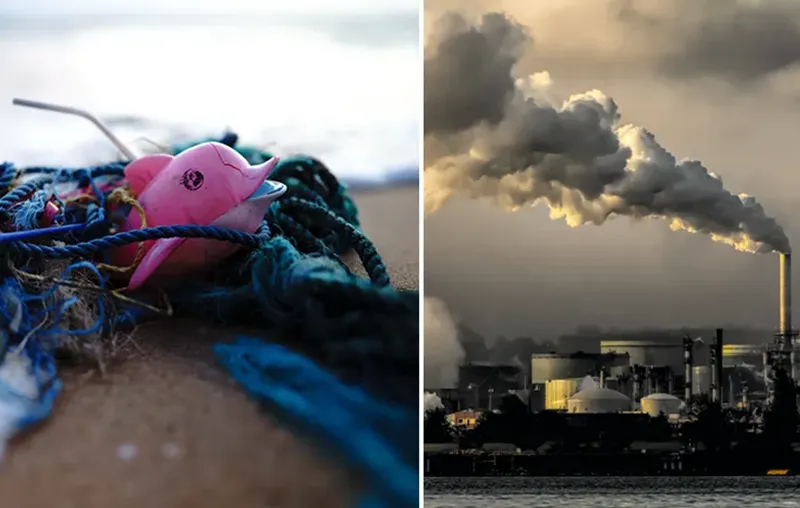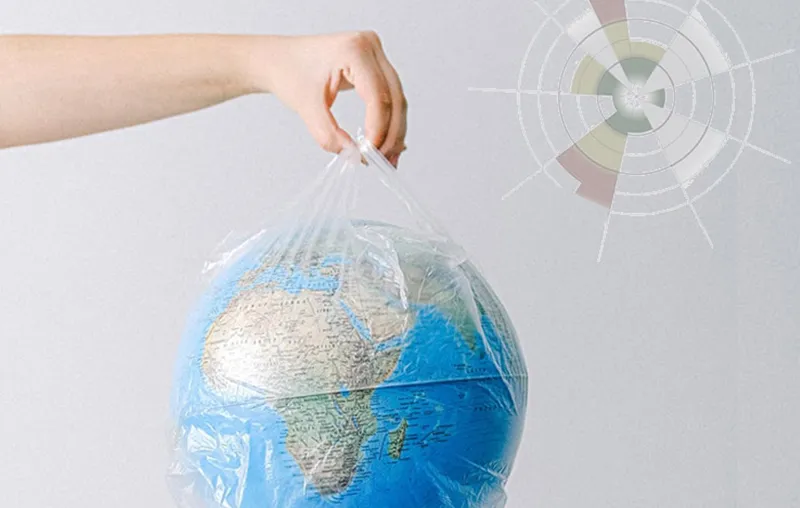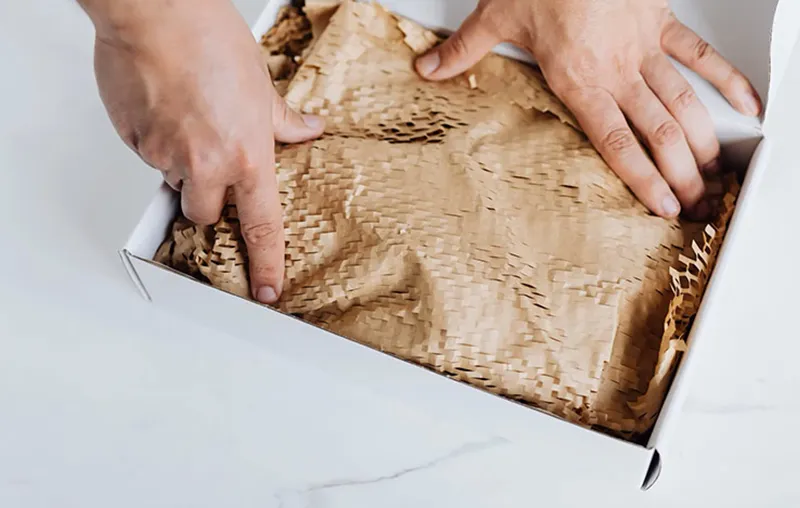What is meant by environmental destruction and what exactly are we humans destroying? If you're looking for answers to these questions and want to learn about things we may soon no longer be able to enjoy in nature, you've come to the right place!
Unser Handeln hat bekanntlich Folgen. Und viele Aktivitäten unseres Alltags haben leider – manchmal bewusst aber oft für viele Menschen unbewusst – massive Umweltschäden oder sogar die Zerstörung ganzer Ökosysteme zur Folge. Eine Konsequenz, die schlussendlich uns selbst trifft, da wir so viele Dinge aus der Natur brauchen und an der Natur lieben, die wir allerdings durch unseren eigenen Lebensstil gefährden.
In diesem Artikel möchte ich dir jetzt einige dieser Dinge vorstellen. Außerdem erläutere ich, was man unter Umweltzerstörung versteht und welche Beispiele die Folgen unseres Handelns greifbarer machen. Auf geht's!
Here you can find a short overview in advance:
Definition: What is actually understood by environmental degradation?
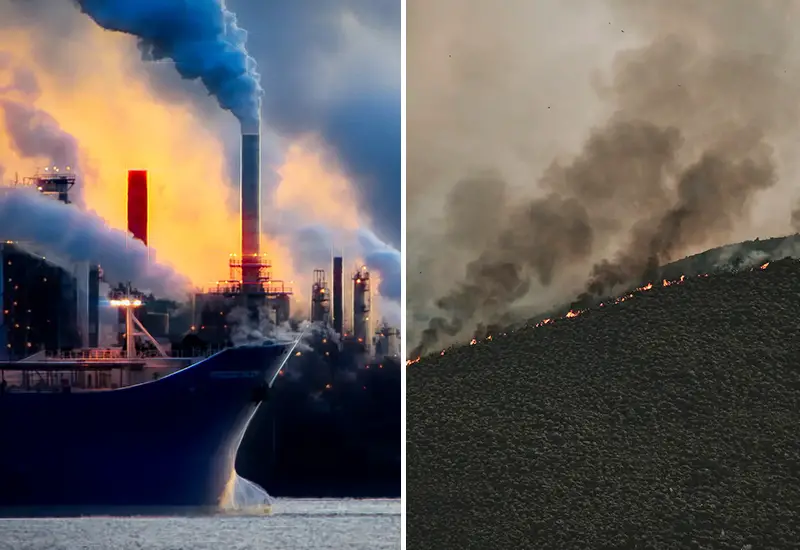
Environmental degradation refers to the short- and long-term Destruction or excessive damage to the natural environment of humans and animals durch menschliche Aktivitäten. Sie kann durchaus eine ungeahnte Folge menschlichen Handelns sein. Doch in den meisten Fällen wird sie aus egoistischen Motiven völlig absichtlich in Kauf genommen.
Ursachen für sukzessive oder massive Umweltzerstörung sind unter anderem die industrielle Landwirtschaft, massiver Landflächenverbrauch und Bodenübernutzung, illegaler Holzhandel, illegale Fischerei, illegale Müllentsorgung oder auch der Raubbau an den Bodenschätzen des Planeten.
The negative effects of human interventions in nature can be both serious direct as well as indirect consequences für unsere Gesundheit und Wirtschaft – aber vor allem grundsätzlich für die Lebensbedingungen auf der Erde – mit sich bringen.
In order to secure our future and preserve the planet for future generations, anthropogenic environmental changes are therefore to be considered as a global crisiswhich requires a sustained and coordinated response.
Examples: How do we humans destroy the environment?
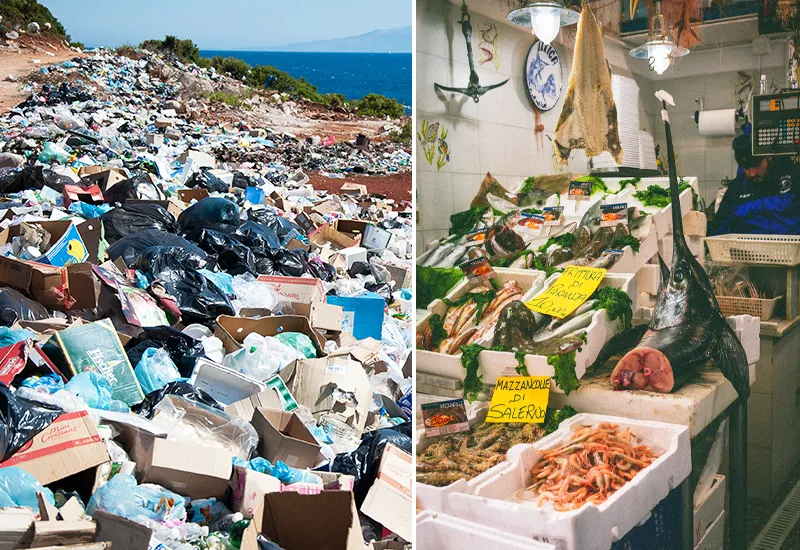
How exactly are we destroying our nature? How do you have to imagine it? Often that is Extent of environmental degradation by one's own or in general human behavior on earth is indeed hardly tangible.
Da viele Environmental problems of our time eine klare Folge menschlicher Aktivitäten sind, sind sie auch can only be solved by us humans ourselves. Um etwas Licht ins Dunkle zu bringen, stelle ich sie dir hier vor:
- Climate change: The global warming is the result of massive emissions of greenhouse gases, which have long led to increasingly extreme weather events, melting polar ice caps and rising sea levels.
- Air pollution: The Pollution of the air and atmosphere by exhaust gases and other emissions from industry, transport and energy production, among other things, results in acid rain and serious illnesses.
- Rainforest deforestation: Plantations for the cultivation of palm oil and animal feed and the production of grazing land, but also the large-scale exploitation of mineral resources and illegal logging, contribute massively to the Deforestation at.
- Plastic waste: Due to a combination of the unconscious, overconsumption of non-biodegradable disposable plastic products and inadequate waste management systems, the problem of the Plastic waste in the environment entstanden. Tüten, Flaschen und Sixpackträger weilen teils Jahrhunderte in der Natur und kosten jährlich Millionen von Meeressäugern und Seevögeln das Leben.
- Drinking water contamination: Main causes of the environmental problem of the Water shortage are, in addition to climate change, mainly waste and pollutants from agriculture and industry discharged into water bodies. They are responsible for the contamination of fresh and drinking water.
- Overfishing: The Overfishing of the seas is a consequence of uncontrolled and excessive fishing for human consumption. Countless fish species are threatened and the sensitive "marine ecosystem" is significantly disturbed.
- Habitat destruction: Habitat loss - among other things as a result of climate change, deforestation, and urbanization - is reflected in the Decline in the diversity of animal and plant species down.
- …
10 things we humans like to do in the environment but destroy ourselves
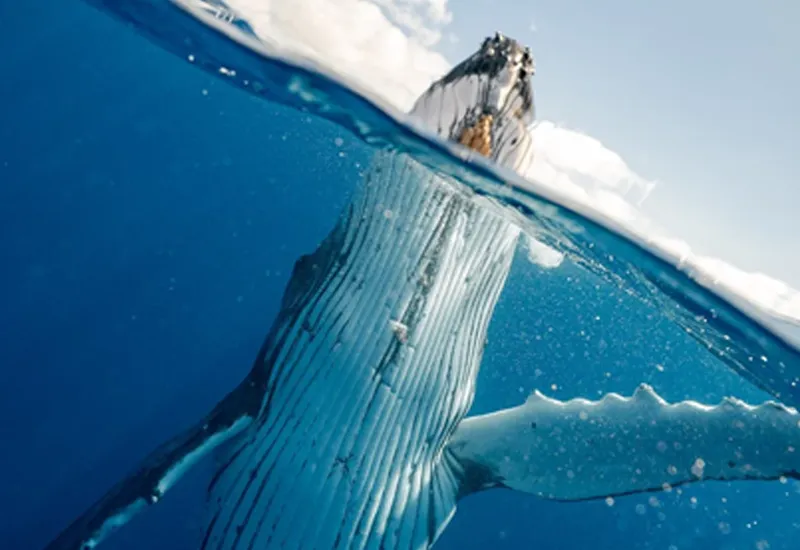
Die eben genannten Beispiele für anthropogene Umweltzerstörung – und viele weitere, wie Lärmbelastung, Light pollution oder generell Umweltkatastrophen, wie Ölunfälle mit Tankschiffen oder Förderplattformen – stehen im unmittelbaren Zusammenhang mit den Dingen, die wir Menschen an der Natur lieben, aber dennoch unwiederbringlich zerstören.v
The Verbindung unseres Handelns mit den bestehenden, ökologischen Problemen are a bit more tangible now, aren't they? Not yet tangible enough? Then I would like to introduce you to the things in which man-made environmental destruction is reflected in our everyday lives.
Here are ten universally appreciated, everyday pleasures, die wir durch Umweltzerstörung verlieren werden. Zumindest solange, bis wir lernen, zukunftsorientierter und live more sustainably.
Notice: In each case, I will give you direct or further recommendations for action that you can implement so that we humans can continue to enjoy the respective beauties of nature.
1. admire majestic whales
Whales are among the most majestic inhabitants of the seas. Many people want to see them for example at Whale Watching Tours up close and personal. Whether planned on a tour or by chance in a coastal region - anyone who has ever had the pleasure of watching the leaps of a southern right whale or a humpback whale will remember this great experience forever.
Unfortunately, the overfishing that is supposed to satisfy our great hunger for fish and seafood is not without consequences for the whales. Simply because their food supply is decreasing. Above all, however, whales are hunted worldwide (despite a whaling ban) in order to, for example Oils, fat and cartilage mass in pharmaceutical products and as a dietary supplement, or to prepare traditional dishes with Whale meat to prepare.
Away from financial interests Whales are also from the large networks of fishing boats and trawlers, in which they often become entangled. Not least, they eat the human Plastic waste, which is used in the Garbage swirls in the sea drifts around. That for example a dead sperm whale with 100 kilogram plastic in stomach washed up on the beach is therefore not a rare event.
To prevent this environmental destruction and a world without whales, we must, among other things, as far as possible plastic free living and avoid products with body parts of whales. It is also advisable, Eliminate fish from your own menu and live vegan, in order to Stop overfishing of the oceans.
Wie das funktioniert, erläutere ich dir jeweils ganz genau in den verlinkten Blogbeiträgen. Außerdem kann ich dir wärmstens die Bücher „Plastikfrei leben für Einsteiger“ (is available here*) and "Vegan & Easy" mit leckere Rezepten (is available here*) to your heart.
2. enjoy soothing chirping of birds
Is there anything more relaxing, als in der Hängematte im Garten beruhigenden Naturgeräuschen wie dem Vogelgezwitscher zu lauschen? Leider ist es stiller geworden in den privaten Gärten – und wenn wir nichts ändern, könnte es absolut still werden.
Die Ursachen dafür liegen vor allem im fortschreitenden, globalen Decline in insect populations, on which birds depend as a main source of food. The excessive use of Pesticides, habitat destruction and climate change are thus reasons for both insect mortality and bird mortality.
Wer weiterhin das Summen der Wildbienen and the Zwitschern der Vögel im eigenen Grün genießen will, sollte den eigenen Garden as close to nature as possible and sustainable design.
Native wildflowers (Saatgut gibt's hier*), schützende Hecken and Water sources draw for example a Bird friendly garden and counteract environmental degradation and its consequences.
Tip: What else you can add to the Promotion of biodiversity I'll be happy to explain what you can do in the linked blog post.
3. lying in the sun on beautiful beaches

A relaxing day on a sunny sandy beach is the epitome of recreation for many people. Unfortunately, the Plastic waste, den man mittlerweile an fast jedem Strand zur Genüge findet, die Idylle. Einzigartige, malerische Strände, wie sie die Urlaubskataloge oft versprechen, kann man im Regelfall nicht mehr bewundern.
Kein Wunder! Wir leben in einer Disposable society with cheap disposable plastic products. We measure these products not much appreciation bei, weil wir sie jederzeit für kleines Geld neu kaufen können. Hinzu kommt, dass viele Menschen ihren (nicht biologisch abbaubaren) Müll in der Natur liegen lassen. (siehe Littering)
Du willst in deiner Freizeit und im wohlverdienten Urlaub auch weiterhin saubere Strände genießen? Dann solltest du dieser Art der Umweltverschmutzung entgegenwirken.
Prefer reusable alternatives (wie z. B. diese Trinkflasche aus Edelstahl* anstelle der pfandfreien Plastikflasche), wirf keinen Plastikmüll und auch keine Cigarette butts into the environment and also like to use all my Zero Waste Tips from the linked article.
Tip: Besides, you can also take a Organize Beach CleanUp or now and then collect garbage on vacation, to set a positive example.
4. breathe in pleasant, fresh air
Kaum etwas ist wohltuender, gesünder und schöner, als frische, saubere und nicht zuletzt lebenswichtige Luft einzuatmen. Ob im eigenen Garten, bei einem Walk, bei einer Fahrradtour oder bei einer Wanderung in den Bergen
But Carbon monoxides, particulate matter, sulfur dioxides and other pollutants that are produced, for example, in factories during the manufacture of goods, by the exhaust emissions of vehicles in road traffic, or by the combustion of coal or heating oil, pollute the air that we let flow into our lungs through our mouths and noses - and thus, sooner or later, our health.
You want to become active and Stop air pollution? Then you can for example reduce your car trips as much as possible by more often by bicycle and public transport on the road. Also through the Celebrating New Year's Eve without rockets oder durch den Switch to green electricity (change here*), you have a decisive impact.
Tip: Alternatively, by the way, I could have chosen the "drinking clean water" example here. As you can see from the Counteracting water scarcity in everyday life I would therefore like to explain this in more detail in the linked blog article.
5. start funny snowball fight

Whether as a child or in adulthood, a snowball fight in the winter is a priceless pleasure. Doch Schneeballschlachten – und auch Wintersportarten wie das Snowboard- und Skifahren – werden zukünftig wohl seltener möglich sein. Denn der Climate change leads to increasingly mild winters and reduced snowfall.
In order to continue to enjoy the white winters and prevent this form of environmental destruction, a more climate-friendly lifestyle indispensable.
Kleine Veränderungen mit großer Wirkung sind zum Beispiel der Switching to the vegan lifestyle (Book Tip: „Vegane Ernährung für Einsteiger“ (is available here*) oder die vegetarische Ernährung. Auch Urlaubsreisen mit der Bahn* instead of by plane or the five-minute Wechsel zu einem Ökostrom-Anbieter* help
6. diving to unique coral reefs
Wer schon einmal in einzigartigen Korallenriffen schnorcheln oder tauchen war, wird dieses atemberaubende Erlebnis niemals vergessen. You dive into a completely new, colorful world, in which one would like to spend much more time.
But we don't have that much time left to enjoy this uniqueness. For about one third of the global coral systems are already in a state in which no more regeneration to be expected is.1
Ursachen für das Coral mortality (bzw. die Korallenbleiche) sind vor allem die Temperaturerhöhung und die Acidification of the oceans durch den Ausstoß menschengemachter Treibhausgase. Neben dem Klimawandel sind auch der Mass tourism, Plastikmüll im Meer, Umweltverschmutzung durch Abwasser und Öl, das Fischen mit Schleppnetzen, aber auch UV-Filter in Sonnencremes, ein wesentlicher Treiber dieser Umweltzerstörung.
How to use the Stop coral dieback and can continue to snorkel and dive colorful? As a matter of principle, live as climate-friendly as possible, prefer on vacation sustainable Souvenirs Without corals and use natürliche Sonnenöle* without chemical additives.
7. harvest and eat juicy fruit
Whether Apples, peaches, melons, cherries, strawberries, avocados, asparagus, broccoli, celery, pumpkins, or cucumbers., whether protein-rich soybeans or crunchy Nuts - we love and enjoy fresh, diverse foods that nature provides us. But for how much longer?
For all the above fruit and vegetable plants - and countless others - are on the Pollination performance the busy bee relies. Doch die wird leider von uns Menschen selbst bedroht. Die industrielle Landwirtschaft, der Anbau in Monokulturen, die Zerstörung von Lebensräumen, aber auch die Luftverschmutzung und nicht zuletzt der Klimawandel, tragen ganz entscheidend dazu bei.
A world without strawberries? Nobody wants that! To prevent this burden on nature, you should use your Reduce ecological footprint in a targeted manner. Also ensure as much as possible bee friendly garden, with the Plants and dwellings that love the animals.
8. watch beautiful butterflies in the garden
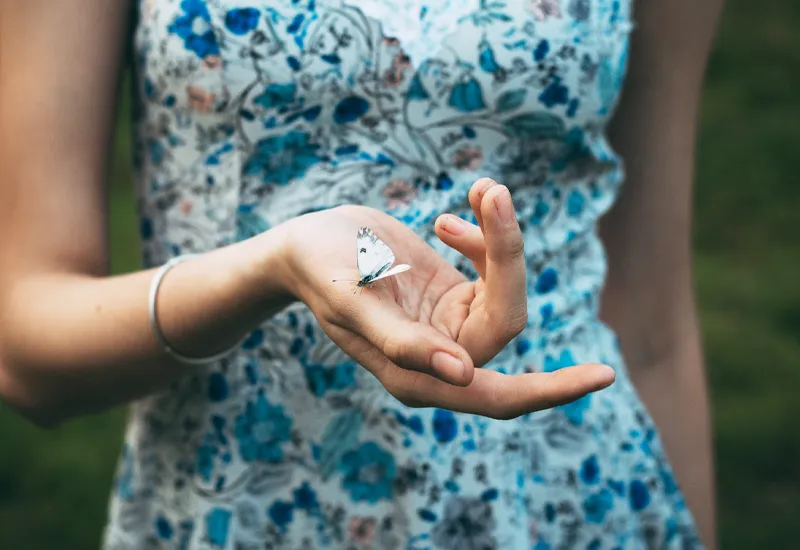
Butterflies are beautiful insects whose sight brings us great joy. But of course they too are affected by the environmental pollution caused by human activity and the resulting Insect mortality affected - and increasingly rare to admire.
The reason for this is mainly that we humans deprive them of their natural habitat and the necessary food sources. The intensive use of pesticides - in the garden, but especially in agriculture - contributes massively to this.
Wie kann man jetzt selbst dazu beitragen, die wunderschönen Tiere weiterhin flattern zu sehen and the Stop insect mortality?
Informiere dich zunächst im verlinkten Blogbeitrag. Und sorge anschließend für Nesting and food in the garden (see Create wildflower meadow, Saatgut gibt's hier*), verwende nur natural fertilizer (z.B. Kaffeesatz), setze auf heimische Pflanzen (schau mal here at the Horstmann nursery*) and eat organic, regional, seasonal and especially plant-based food.
9. admire mighty glaciers
Glaciers are majestic natural wonders. You can admire them for hours, but unfortunately probably not forever. Because through the Global warming they are thawing at an alarming rate, leaving mountains without ice. With one record-breaking summer of heat following the next, this is hardly surprising.
Durch die zunehmenden Schmelzraten könnte es tatsächlich schon in den 2040er Jahren keine Gletscher mehr in Deutschland geben.2 Außerdem lässt die Gletscherschmelze das bisher gebundene (Trink-)Wasser ins Meer fließen. Die Austrocknung oder starke Lowering of water levels of rivers and lakes, acute shortage of drinking water and resulting drought catastrophes are among the possible serious consequences.
How to save the glaciers? Above all, once again, through a lifestyle that counteracts climate change. Vegan lifestyle (Cookbook tip: Vegan & Easy*), öffentliche Verkehrsmittel nutzen, auf grünen Strom umsteigen. Aber ich wiederhole mich. 😉
10. night starry sky watching
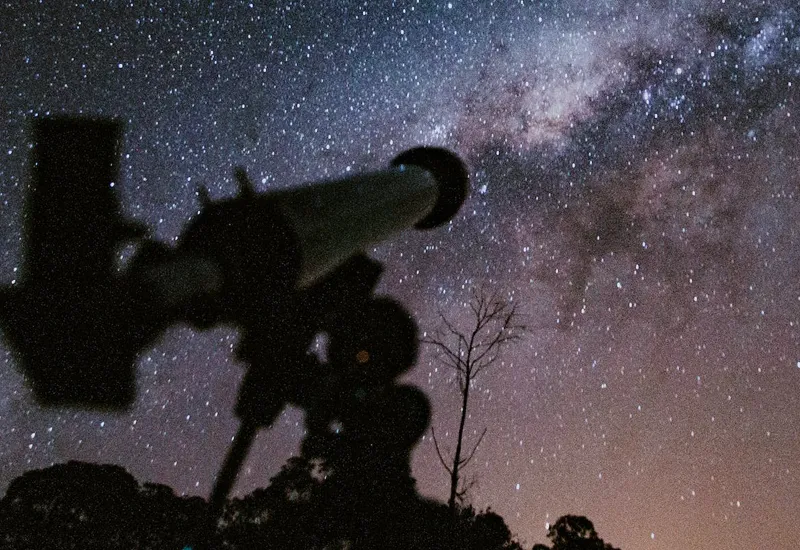
Ein Sternenhimmel ist immer ein faszinierender Anblick. Besondere Freude bereitet es uns, Searching for constellations like the Little Dipper or the Big Dipper. But the increasing Light pollution (vor allem in Städten und dichter besiedelten Gebieten) macht es immer schwieriger, die Sterne überhaupt am Himmel zu sehen.
Dabei handelt es sich um eine Umweltschmutzung durch immer mehr und viel zu viele künstliche Lichtquellen. Zum Beispiel durch den Straßenverkehr, Straßenlaternen und beleuchtete Werbedisplays.
The Night sky finally becomes so much by unnatural light aufgehellt, dass dies in den betroffenen Regionen die Abwesenheit völliger Dunkelheit zur Folge hat.
With massive consequences for nature. Light pollution, for example, is considered Main driver of insect mortality. Sie irritiert generell auch Zugtiere und bringt nicht zuletzt auch unseren eigenen Tag-Nacht-Rhythmus durcheinander.
How you can stop the environmental pollution caused by artificial light? For example, by Light really only switched on when needed oder dafür Motion detector installierst. Auch die Bevorzugung von Lichtquellen mit low blue content and the alignment of Outdoor lamps to the ground, rather than to heaven, help immensely.
Umweltzerstörung durch den Menschen: Schlussendlich schaden wir uns selbst
Environmental destruction is (sooner or later) human destruction. As long as we damage, rob and pollute our nature, we continue to literally saw the branch on which we are sitting.
Heute hast du erfahren, was genau man unter Umweltzerstörung versteht und welche Beispiele und ökologischen Herausforderungen die Thematik greifbarer machen. Außerdem weißt du nun, wie wir die Things we love so much about nature vor uns selbst schützen können. Sei es das Bewundern von gewaltigen Gletschern oder das Tauchen zu bunten Korallenriffen.
Use the ideas and advice around your Environmental awareness und deine zukunftsorientierte Einstellung zu fördern. Schlussendlich geht es darum, die Probleme als Folge des eigenen Handelns zu erkennen. Noch viel wichtiger ist es jedoch, ein proaktiver Teil der Lösung zu sein.
"Ultimately humanity is one, and this small planet is our only home. If we're to protect this home of ours, each of us needs to experience a vivid sense of universal altruism and compassion."
Dalai Lama (more at Environmental protection quotes)
Ich hoffe, dass dir das Wissen und die Erkenntnisse aus diesem Beitrag weiterhelfen. Zum Schluss möchte ich dir hier noch ein paar further blog articles ans Herz legen. Nutze sie, um der Umweltzerstörung durch menschliche Aktivitäten zusätzlich entgegen zu wirken:
- Environmental sins of everyday life
- Why environmental protection is so important
- How you protect the environment in everyday life
- Good reasons for the vegan lifestyle
Do you have questions, suggestions or can you think of other things that are destroyed by human intervention in nature? Then I look forward to your comment.
Bleib umweltfreundlich,

PS: Climate change is probably the most serious and biggest environmental problem of our days. By reducing your Consciously reduce CO2 emissionsyou can counteract it. I'll gladly explain to you how easy it is in the linked blog post.
- Deutschlandfunk; Interview mit Christian Wild: Wissenschaftler über Korallensterben „Befinden uns in ganz tiefer Korallenriffkrise“ (Stand: 21.07.2021), abrufbar unter https://www.deutschlandfunk.de/wissenschaftler-ueber-korallensterben-befinden-uns-in-ganz-100.html. [24.02.2025]. ↩︎
- C. Mayer, W. Hagg, M. Weber, A. Lambrecht: Zukunft ohne Eis – Zweiter Bayerischer Gletscherbericht: Klimawandel in den Alpen. Hrsg.: Bayerische Akademie der Wissenschaften, Bayerisches Staatsministerium für Umwelt und Verbraucherschutz, April 2021. ↩︎

